Instead of understanding international communication only through language learning, The Effective Communication Tree© represents a methodology developed to equip non-native English speakers with the skills to thrive and achieve in multicultural work settings.
1. Linguistic Skills:
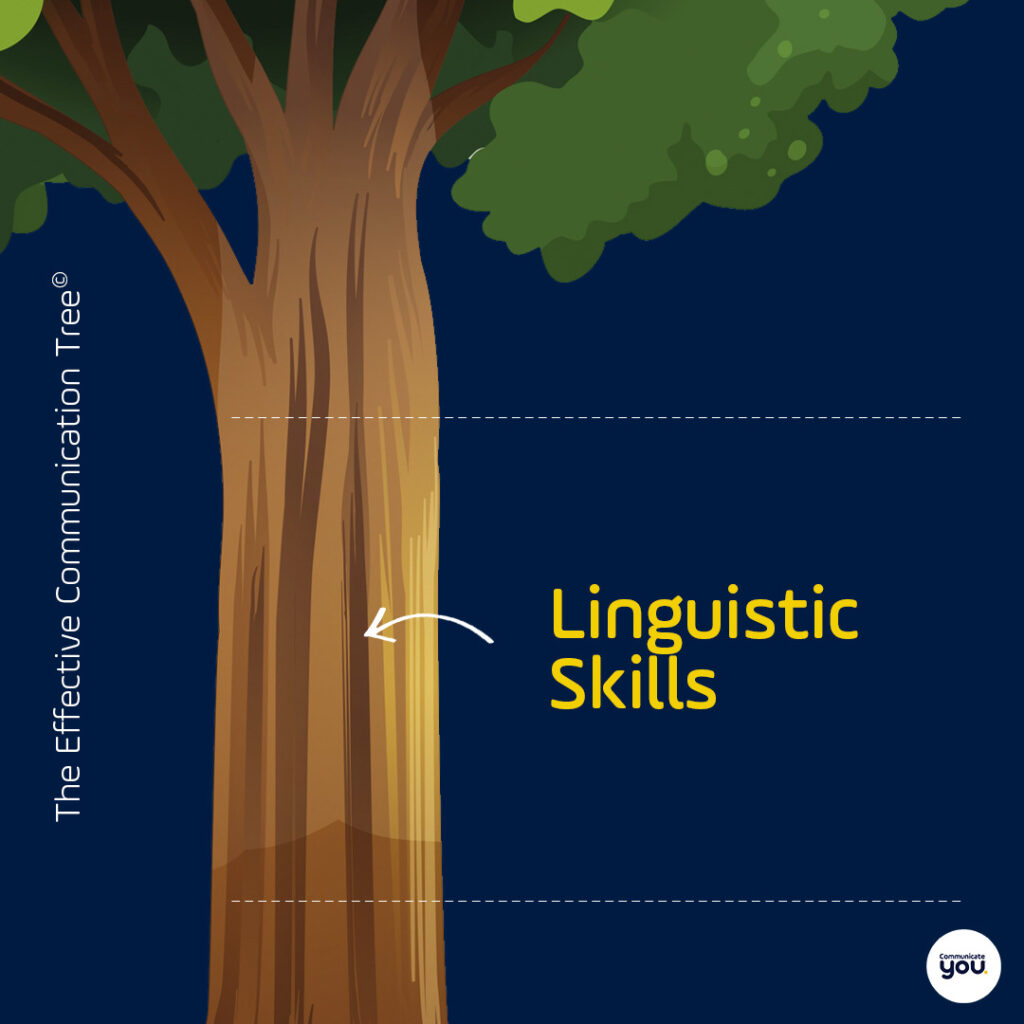
Whenever we talk about languages, we first think about Linguistic skills.
Linguistic skills refer to understanding and using grammar, structure, phonology (sounds) and semantics (meaning).
In English as a Second Language learning, those linguistic skills are divided into four capabilities to facilitate language acquisition: Speaking, Listening, Writing and Reading.
You start at the beginner level, then intermediate levels, advanced and proficient levels – this all refers to how deep your language knowledge goes and/or how much you need to improve because knowing more of the language will provide you range when speaking.
I see Language Skills as the most important skill in speaking English, but Language Skills only won’t take you far in terms of communicating well in English internationally and interculturally. This will happen because you are removing YOURSELF from the equation – the most crucial element in communication.
Looking at our tree, we will place Linguistic Skills as the mighty trunk.
The place of power and structure as learning our Linguistic Skills will help us to grow and expand our communicative possibilities (social and emotional intelligence skills) and to explore all prospects of our strong roots (cultural intelligence skills).
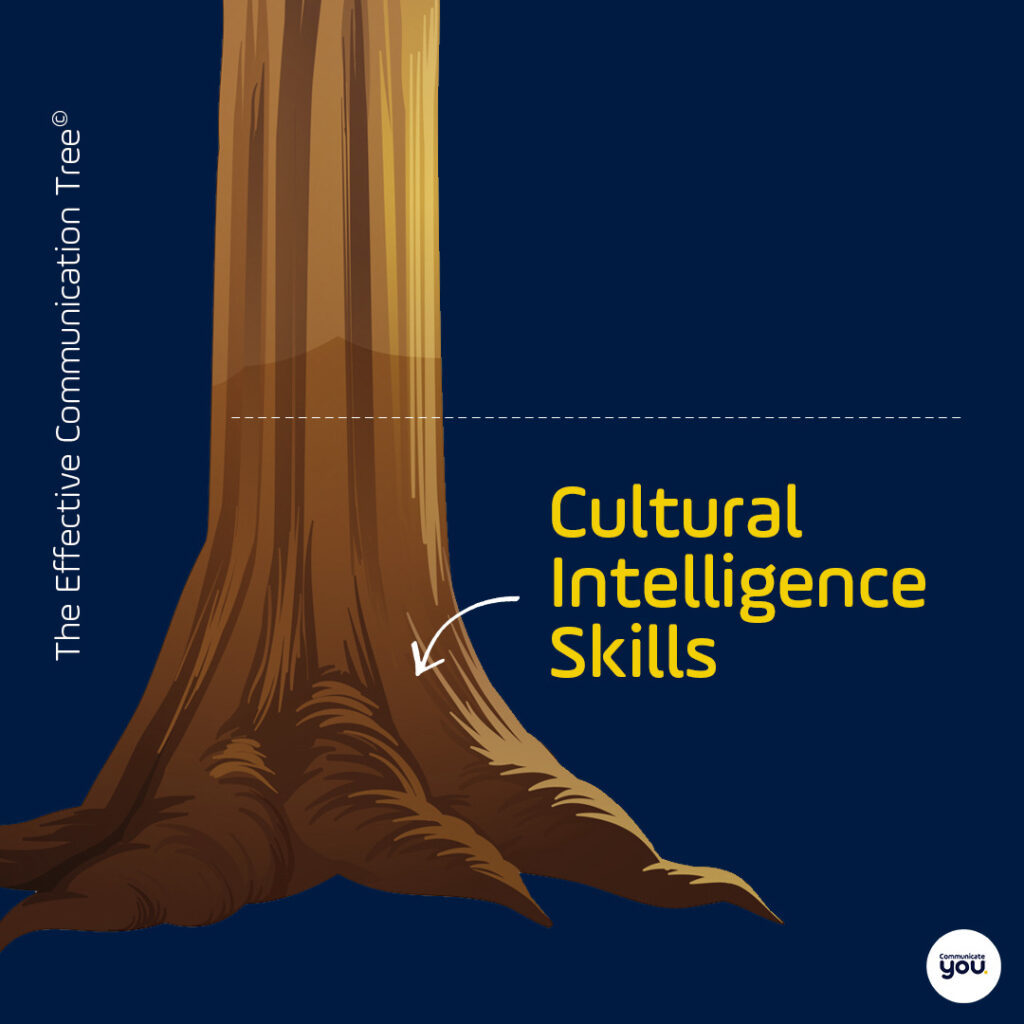
2. Cultural Intelligence Skills:
LiveScience defines culture as “the characteristics and knowledge of a particular group of people, encompassing language, religion, cuisine, social habits, music and arts.”
Do you see? Language is PART of culture and should also be considered when learned as a second language.
Cultural Intelligence skills refer to the ability to identify different cultural settings, make sense of them and blend in respectfully.
Understanding the cultural context of the English language and how it relates to your cultural context will help you not only to understand when misunderstandings happen while communicating but also why they happen and how to avoid them!
When you are living abroad or planning on, understanding how cultural differences affect your English can save you a lifetime of miscommunication and awkward encounters.
In our tree, Cultural Intelligence Skills will be the roots.
They are what you already are (your cultural background) blending with where you want to be – an International communicator who learned the English Language Cultural Context© and the English Language Communicative Profile© able to perform superior language adjustments when working in multicultural settings.
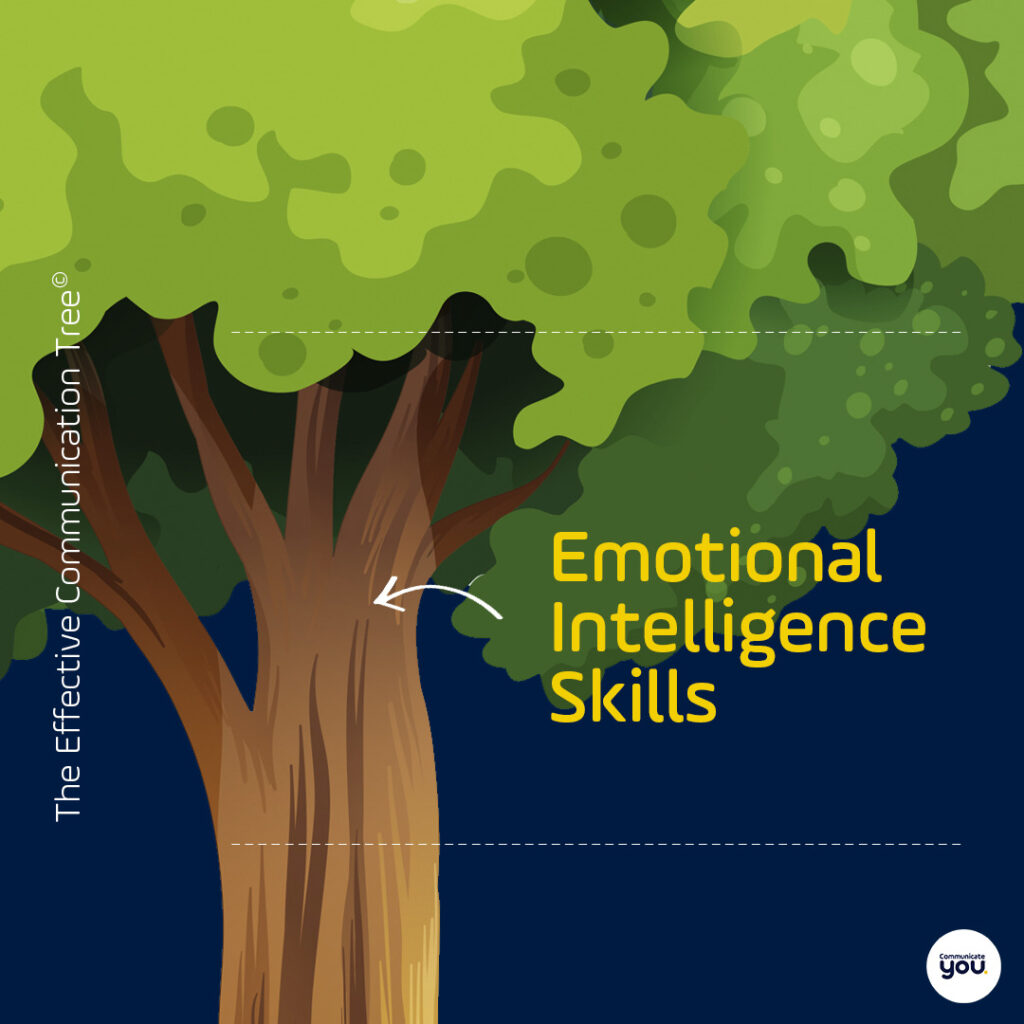
3. Emotional Intelligence Skills:
Emotional intelligence skills are defined as the set of abilities that regulate our thoughts, emotions and behaviour (OECD)
Basically, Emotional Intelligence skills are related to how we manage our emotions, as well as become aware of the feelings of others.
In becoming a counsellor, I realised how important it is to understand and apply Emotional Intelligence skills in our lives and how they affect what we communicate.
For example:
How hard is it for you to make a presentation on sales figures in English at work when you are FEELING insecure about your communication abilities (even though you are confident that you are ready to present it)?
Or Participating in a job interview when you FEEL unprepared (even though you have a smart resume under your armpit)?
If we are non-native speakers of English wanting to improve the quality of the message we pass on, then understanding our emotional states and organizing our thoughts/mindset will directly affect how we communicate.
In our tree, Emotional Intelligence skills are the branches.
They sprout from the trunk and spread the energy of our words because we can understand where they are coming from and be intentional when delivering our messages in an international setting.
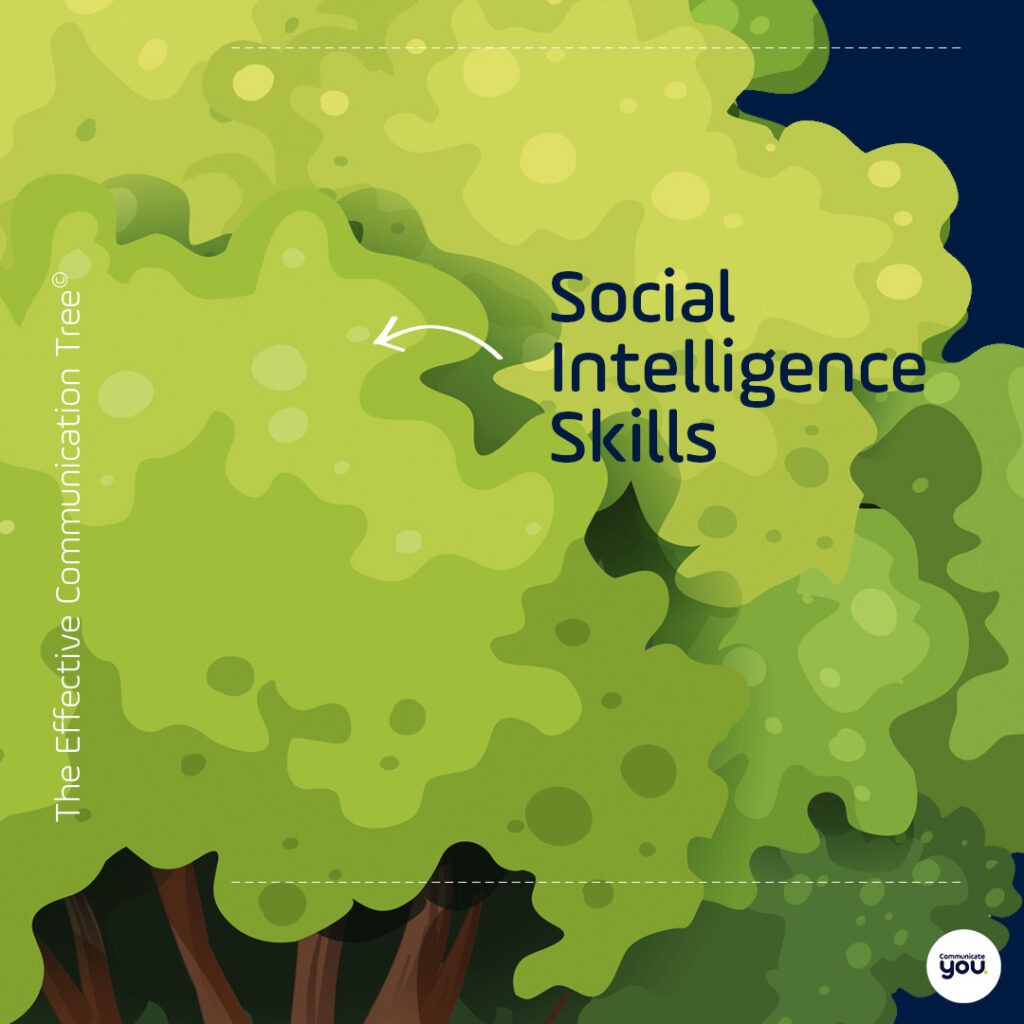
4. Social Intelligence Skills:
Social Intelligence skills are the abilities necessary to get along with others and create and maintain satisfying relationships. (OECD)
We don’t learn The Present Perfect so that we can yell sentences at ourselves in the mirror, do we?
We learn English grammar to enhance the quality of our message and to communicate appropriately but learning the language primarily so we can use it when conversing with people.
The social aspect of communication is the outward movement from what we have learned.
It is how we deliver our message, who we are impacting with it and when it is appropriate to transmit a message at all.
Our Social Intelligence skills will be the leaves of our tree.
It’s the last effort in our communication process, but their healthy and shining colour is what people will be able to first spot from a distance.
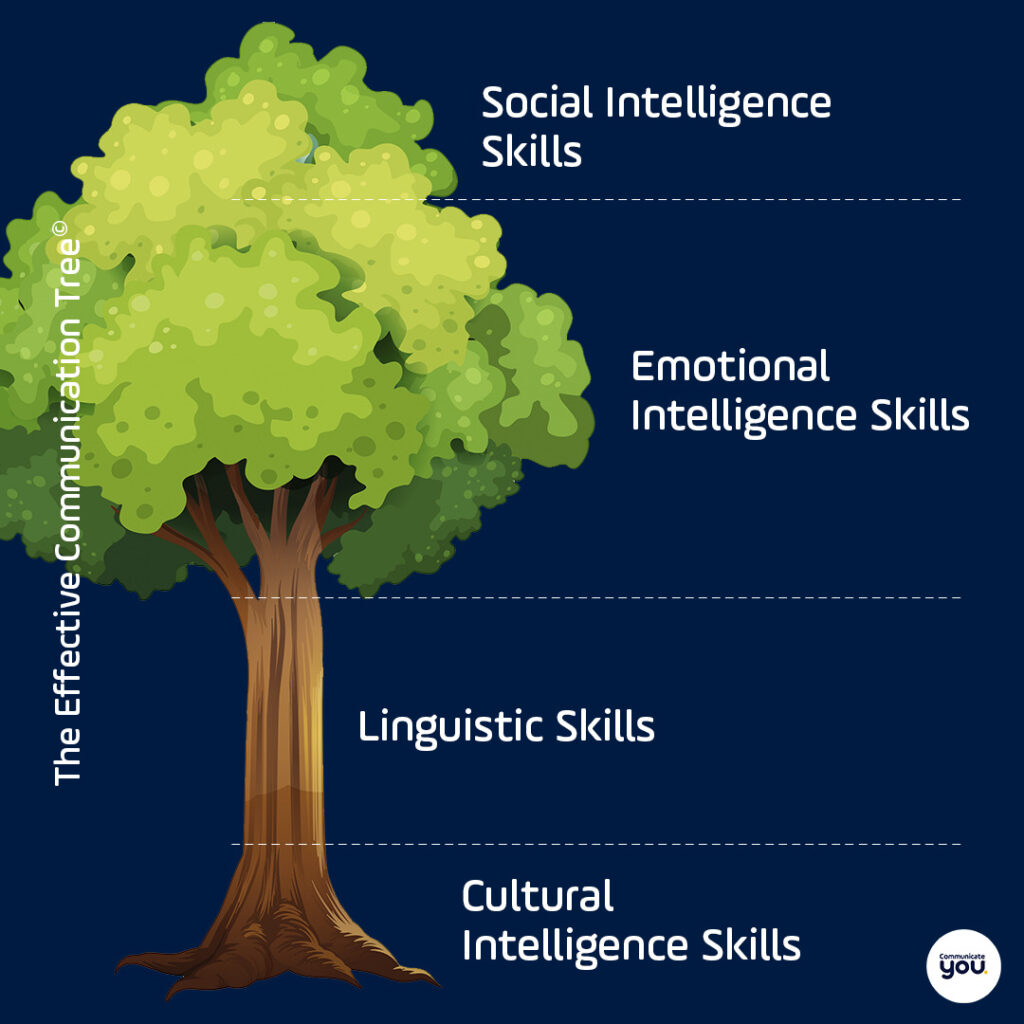
The Effective Communication Tree© in full for your reference.
The international communication process for non-native English speakers is a beautiful and complex process that is often reduced to language skills acquisition.
No one is denying the importance of acquiring language skills in order to communicate better in English; on the contrary!
I teach that language skills are essential for a non-native speaker – YES, you need to build those skills and continually improve them.
𝐁𝐔𝐓 𝐭𝐡𝐞𝐲 𝐚𝐫𝐞 𝐣𝐮𝐬𝐭 𝐧𝐨𝐭 𝐭𝐡𝐞 𝐨𝐧𝐥𝐲 𝐟𝐚𝐜𝐭𝐨𝐫 𝐭𝐨 𝐛𝐞 𝐜𝐨𝐧𝐬𝐢𝐝𝐞𝐫𝐞𝐝 𝐰𝐡𝐞𝐧 𝐭𝐡𝐢𝐧𝐤𝐢𝐧𝐠 𝐨𝐟 𝐂𝐎𝐌𝐌𝐔𝐍𝐈𝐂𝐀𝐓𝐈𝐍𝐆 𝐄𝐅𝐅𝐄𝐂𝐓𝐈𝐕𝐄𝐋𝐘 𝐢𝐧 𝐄𝐧𝐠𝐥𝐢𝐬𝐡 in international and multicultural settings.
A challenge is better dealt with once you understand it.
To solve the problem, we should go back to what caused it.
We spent our lives being told that learning Language skills would guarantee the shade of an abundant and lively tree, and all we had was a trunk – functional but not complete.
Now is when, instead of mere speakers, we become the communicators we were all born to be.

